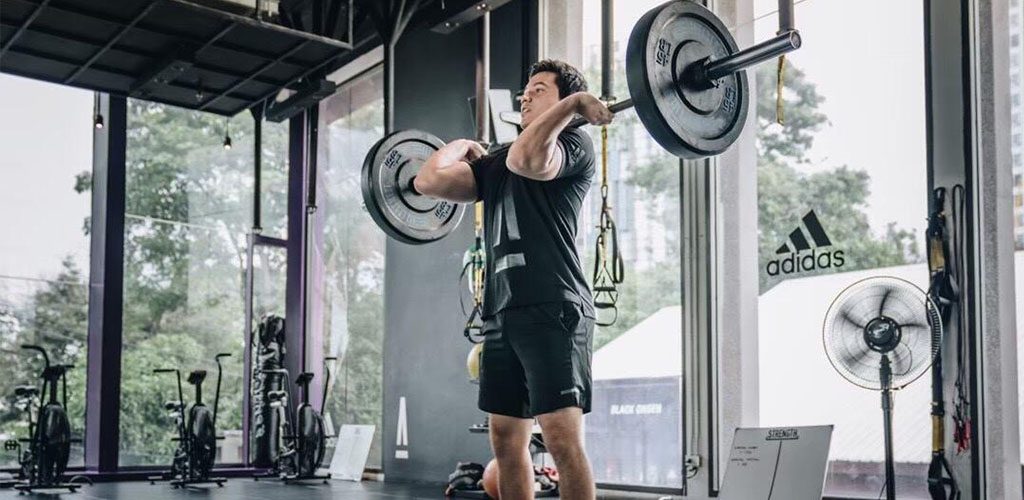Nutrition for training and performance with Coach Jason Deknatel
Jack Thomas brings back BASE Coach Jason to talk about nutrition for performance and training. They discuss hydration, what you should be consuming pre and post workout and considerations for strength and endurance training.
Nutrition plays an essential role in your training and performance. How should you eat to perform your best? Is pre/post workout necessary? How much protein should you eat?
Coach Jason takes us through how to structure proper nutrition program to fuel top performance.
First question, how much should we drink to stay hydrated during our training?
In most case, you only need to drink a small amount when you feel thirsty. The rare case when you have to drink more would be when you’re training outdoors in high temperature.
Our body has a mechanism of telling us when it needs water which is giving you the thirsty feeling so you won’t die from hydration. Drinking too much water can negatively affect your performance, you do not need to pressure yourself to drink.
What should we drink? Is there anything better than water?
Water is the best. If you’re very dehydrated from long hours of training, add some electrolytes powder can help replenish mineral loss
Next up, what should you consider when structuring your nutrition plan with different types of training; for example, endurance and strength training.
We need to look at the macros, three main source from energies from food, and the proportion in carbohydrates, protein and fat to optimise our performance.
For strength training, protein is essential for muscle synthesis so you want to reach your protein consumption goal. On average you will need 2 grams of protein and 2-5 grams of carbs per 1 kilogram of bodyweight. If I weigh 80 kilograms, I will want to consume 160 grams of protein and 160-400 grams of carbs per day.
For endurance training, you’re training long hours so you want to make sure you have enough carbs, easy to convert to energy, to fuel you throughout the session. From NSCA guidelines (National Strength an Conditioning Association), you will need 8-10 grams of carbs per 1 kilogram of bodyweight to help with long training hours. You will only need moderate amount of protein just to maintain muscle mass as opposed to higher protein in strength training athletes.
Would you recommend people to stick numbers for macro breakdown? Do they need to specifically hit those grams for protein, carbs and fat?
For general public, I recommend you control as many factors as you conveniently can. If you’re not a top level athletes who need to take their diet tediously, a strict diet regime can put you off diet completely.
My suggestion is to start off with tracking for 2 weeks to know where you stand comparing to your nutrition goals. If you’re 70-80% there, that is already a good amount for long term plan.
When you track or measure your nutrition for a while you will get the idea of how much 160 grams of protein looks like and so on. After that you can estimate it without measuring or tracking everything strictly.

If you’re trying to build muscle, how much protein should you consume? What does scientific research say?
Protein consumption comes second from the total calories intake. If you want to build muscle mass, being in a calories surplus is the most important thing.
Researches would suggest around 1.6-2.5 grams per 1 kilogram of bodyweight. Again you will need to try and observe the changes. If you stick to a number and you have a drastic weight loss, then you should increase your intake.
Is it fair to say this is a trial and error? Should we try and adjust accordingly or just stick to calculated numbers?
Nutrition is not a one size fit all, it is a lot of personal preference as well. Some people find it impossible to eat without protein while some others struggle to eat protein to their goal.
You need to check your own preference and make it works. For example, if you cannot hit your protein threshold, you can consider taking liquid protein to consume it easier.
Is pre and post workout necessary? What should we eat before and after our session to get the most from it.
Actually your pre workout can be food that wouldn’t make you feel uncomfortable during training. Some carbs for energy and a little bit of protein. High fat food can negatively affect your performance, so save that for post workout.
For post workout, have a combination of carbs, protein and fat of your choice. Reminder that it doesn’t have to be chicken breast. Choose the protein source of your preference, it can be beef, fish or tofu if you’re vegetarian/vegan.
Bear in mind that plant protein is an incomplete protein, unlike those from animals which are made of all necessary Amino acids. You might want to mix up plant protein from multiple sources since they compliment each other; for example, mix up rice and beans. Also you can go a bit on surplus for plant protein since your body cannot absorb them as efficiently as protein from animals.
Is there any research on timing to eat before and after workout?
Generally you will want to eat at least one hour before the session. Ideally one and a half to two hours. Keep the pre workout smaller as it is closer to training time.
You can actually eat a decent sized meal if you have two hours before the training. If you really don’t have time, some carbs are enough to fuel your session.

What about timing of your post workout?
We used to have a misconception that if we don’t eat within a certain amount of time after our session, we will lose muscle and all the gains.
Our muscle protein synthesis peaks at around two hours after the training and lasts up to 24 hours. This window is big and is hard to miss. You will feel hungry within this window anyway especially if you haven’t had much before the session. Have some carbohydrates to replenish the glycogen loss from training and protein to help with muscle rebuilding.
What about micronutrients? If we want to maximise our performance do we only look at macronutrients?
For performance it is mainly about macronutrients. For general health aspect, you should eat a variety of vegetables. If you struggle to eat adequate vegetables, seek advice on taking supplements.
Generally, supplementation is not necessary. Try to get nutrients from real food if you can.
Do you have any nutritional tips for endurance training or the long hours of cardio training, like marathon or iron man?
We need to zoom out and look at a bigger picture here. Nutrition is important but you will want to approach this comprehensively by taking into account training and recovery as well. These three components come hand in hand.
For nutrition, as mentioned earlier, you will want around 2 grams of protein and 8-10 grams of carbs per 1 kilogram bodyweight. But even if you perfect your nutrition, training and recovery are equally important. You’re training long hours, if you train everyday and don’t recover properly you can end up injured yourself easily. This is also the same for strength training.
For example, if I do squat on Monday I will not want to squat again on Tuesday or Wednesday since those muscle groups need recovery. I can work my chest or posterior muscles instead. The same goes to endurance training. If you do high intensity bike in the morning and low intensity swim in the evening, switch up the program on the following day. You can run high intensity and bike at low intensity so you don’t overwork your body.
Each aspect feeds nicely into the others, so keep training, nutrition and recovery all in check. Missing one component will be reflected in your performance.
BASE RESOURCES
Contact us: [email protected]
BASE Facebook: facebook.com/basebangkok
BASE Instagram: instagram.com/basebangkok
GUEST RESOURCES
Jason on Instagram: instagram.com/jason_basebkk/
Coach Jason’s profile: basebangkok.com/team/Jason


